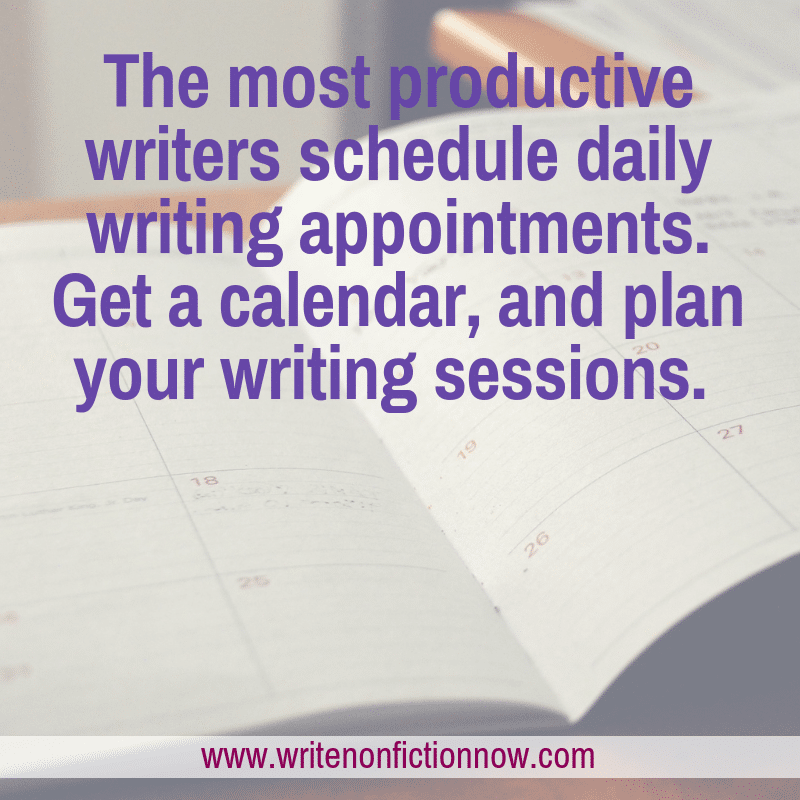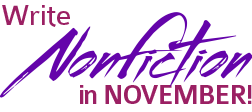 If you are like most aspiring writers, you write inconsistently. You might even call yourself a “sporadic” writer. If you’d like to change that fact and write consistently, you need to use one tool religiously: a calendar.
If you are like most aspiring writers, you write inconsistently. You might even call yourself a “sporadic” writer. If you’d like to change that fact and write consistently, you need to use one tool religiously: a calendar.
A calendar provides the key to a consistent writing practice. And when you write consistently, you stop aspiring to become a writer and become a writer.
Sounds easy and logical, right? Yet, more people rely on memory and to-do lists rather than calendars. That explains why they aren’t more successful. Additionally, they don’t prioritize their most important tasks—like writing. Instead, they put everything else first and try to squeeze writing in when it seems possible.
Does that sound familiar?
That’s why this month’s challenge revolves around scheduling writing time on your calendar. If you don’t do this one thing, you will struggle to write consistently—and to finish your Write Nonfiction in November (WNFIN) Challenge project. If you schedule writing blocks on a calendar during November, though, you’ll find yourself more easily completing your WNFIN project in 30-days.
And this holds true at any time of the year…and all year long.
Productive writers plan their time. They know that writing daily requires scheduled writing time—and the commitment to show up for their writing appointments.
November Nonfiction Writer’s Challenge
To complete this month’s challenge, block out daily writing appointments on a calendar. Plan your writing time every day, and consider that block of time sacred.
There are four steps to using a calendar effectively:
- Make daily appointments with yourself.
- Write the appointments down on a calendar, in a daily planner, or in a scheduling app.
- Show up for your writing appointment on time and ready to write.
- Don’t leave your writing appointment until you’ve been at your desk the entire time allotted or you’ve met a specific goal, such as a daily word-count quota.
Schedule Your Appointments on a Calendar
Getting a calendar or planner and scheduling your writing blocks may seem simplistic. Indeed, you might think of it as common practice—but common practice is not always common knowledge.
Many of the writers I work with do not use calendars…for anything! It’s no wonder they don’t show up consistently to write and have days that “get away from them” due to unexpected, unplanned, and forgotten tasks and meetings.
Using a calendar is easy and prevents those types of challenges. Just jot down your writing appointment on any given day—and then look at the calendar to remind yourself of your schedule.
For busy people, a planner of some sort often works better. These books tend to offer you ways to organize your days in more detail.
I find using a planner easier than a calendar because it gives me a way to plan my daily schedule. Most calendars don’t have time blocks like below.

There are lots of great planners. You can purchase one if you don’t already have one. I currently use the Panda Planner, but I’ve also found John Lee Dumas’ Mastery Journal effective. I will be purchasing Brendon Burchard’s High Performance Planner when it releases this month and trying that in the new year.
Of course, you also can use an online calendar and block time there. In addition to my planner, I use Ical, which allows me to leave my planner at home and still access my schedule via my phone or iPad. Google calendar works equally well.

Don’t Miss Your Scheduled Appointments
The most productive writers—like high performers in any career—plan out their entire day. They stick to their schedule as much as possible.
You, too, need to plan your days and stick to that plan. Once created, imagine your schedule is set in stone. See yourself as a CEO with a full day of meetings. You are expected to show up for each one.
Or treat your writing appointments like doctor visits. You wouldn’t cancel one of those the day you are supposed to show up. If you did, you’d likely be charged for the session—and insurance won’t cover the expense.
The same is true of canceling a coaching or personal training appointment. You will end up paying…for nothing.
When it comes to your writing appointments, a “no-show” means you lose. You get no writing done and make no progress toward your goal. In the case of a WNFIN project, too many missed appointments can mean your project remains unfinished on December 1.
Create a Writing Schedule
Schedule writing time on your calendar daily. Sometimes I create my schedule the night before. More often, I plan my writing time weekly—at the same time each day, if at all possible.
When you take on a 30-day writing challenge, though, I suggest you create a writing schedule for the entire month. Block out time to write every day of the month.
Doing so helps you plan ahead. With your writing schedule set, you can schedule other appointments or tasks around your writing blocks. This prevents you from trying to fit in writing—and, potentially, not finding a time slot that works. Instead, everything else has to fit in around writing.
Don’t forget to schedule in “make-up” writing appointments. These come in handy in case you get sick, an emergency arises, or you can’t write for some reason. If you don’t plan ahead, you might find yourself without time to write—a common complaint amongst writers, especially during WNFIN.
Usually, I write first thing in the morning. Occasionally, that doesn’t work an I have to find another time slot.
Writing at the same time daily sets me up to succeed. When I sit down at 6:30 or 7 a.m., my mind and body immediately go to work. It’s a habit, routine, or ritual.
Become a Prolific Writer
Writers who schedule writing blocks on a consistent basis write consistently. I see this over and over again in my High-Performance Writer program. Once clients begin using a calendar, they shift from people aspiring to write—talking about it more than doing it—to *writers.” They write every day…no matter what.
That means they also become more and more productive over time. These writers produce more and more words consistently. In fact, I’d call them prolific!
That can be you—a prolific writer. When you begin to schedule writing appointments on a calendar or in a planner or scheduling app, you’ll discover that writing daily is easy and fulfilling. And, you can write a book—or anything else—in 30 days or by whatever deadline you choose.
A calendar makes all the difference.
Do you use a calendar, planner, or app to schedule your writing blocks? If so, what difference has it made in your writing consistency and productivity?
 This post is part of the 2018 Write Nonfiction in November (WNFIN) Challenge, also known as National Nonfiction Writing Month (NaNonFiWriMo). Find out more about how to participate by clicking here.
This post is part of the 2018 Write Nonfiction in November (WNFIN) Challenge, also known as National Nonfiction Writing Month (NaNonFiWriMo). Find out more about how to participate by clicking here.
The event is sponsored by the Nonfiction Writers’ University. Get a 1-week trial membership for just $1!
Photo courtesy of Free-Photos / 9114 images